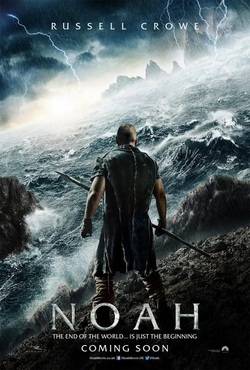
When I managed three book clubs, members had to mail in a card if they did not want a main selection. If you wanted to buy the main offering, you did nothing. (Please stick with me on this!)
Then I got the bright idea of offering dual main selections—two books at once—on the theory that members would have twice as many opportunities to say, “yes.”
I was wrong. Instead, I gave the members twice as many reasons to say, “no.” The number of cards we received skyrocketed. Members didn’t want one or the other or both of the books.
That’s what the movie Noah got wrong. Very wrong. By trying to offer something for everyone, it offers viewers twice as many reasons to say, “no.”
Kathleen Parker of the Washington Post says, “If you liked Braveheart, Gladiator, Star Wars, The Lord of the Rings, Indiana Jones or Titanic, you will like Noah.” Kathleen Parker is behind the times. If you liked the movies that were in previews when I viewed Noah in my local theater, you’ll like Noah—Guardian of the Galaxy (based on a Marvel Comic, it involves a manhunt in the far reaches of space), The Amazing Spiderman 2, Transformers: Age of Extinction (by the way, the Watchers in Noah bear a remarkable resemblance to Transformers), and Transcendence (A researcher in Artificial Intelligence creates a machine combining intelligence and emotions).
Asking if Noah is biblically accurate is like asking if Beethoven’s Fifth Symphony is green. The question doesn’t make sense. It’s irrelevant. Paramount’s disclaimer that "The film is inspired by the story of Noah. While artistic license has been taken” is accurate. The rest of the disclaimer is a somewhat questionable: “We believe that this film is true to the essence, values, and integrity of a story that is a cornerstone of faith for millions of people worldwide.”
Noah was not written to cater to evangelical Christians. It was written by two self-described "not very religious Jewish guys" from New York City. The story written by Darren Aronofsky and Ari Handel first appeared in a French-language graphic novel with a six-armed giant rock-angel on the cover. Noah was described by Slashfilm as a ‘Mad Max-style warrior.’ The movie was written for an audience that loves graphic novels and Mad Max (a 1979 Australian dystopian action film).
Noah “lives with his wife and three children in a land barren and hostile, in the grip of severe drought. (It’s) a world marked by violence and barbarism,” says the publisher of Aronofsky’s graphic novel.
Darren Arronofsky and Ari Handel wrote their story of Noah for themselves; they produced it to appeal to those who like graphic novels and Transformers: Age of Extinction. There’s nothing wrong with that, but trying to retrofit the movie to appeal to Christians has resulted in something that gives viewers twice the opportunity to say, “no thanks.” I’m sorry, but a scene of giant six-armed transformer-like rock angels defending the ark and throwing the wicked followers of Tubal-Cain around does not mix well with a 1950s-type sappy ending of everyone living happily ever after, Noah telling his children to “be fruitful, multiply, and replenish the earth” (in the Bible God said that), and a rainbow filling the screen with comforting colors.
Yes, the movie deals with some important theological questions. Balancing justice and mercy is an important theme in the movie. But it’s not really resolved. Robert Schuller said God creatively combined justice and mercy at the cross. Noah never makes it to the cross. What Noah does do is gives us the opportunity of talking about justice and mercy.
Noah also gives us the opportunity of asking if we are always sure of what God is telling us. And if we are sure, how do we deal with people who disagree with us? And if we are not sure, how do we deal with that uncertainty? Noah didn’t deal with his uncertainty very well. He alienated his entire family when he attempted to do what he thought God was telling him.
But we don’t need the movie Noah to lead us into theological and moral discussions. Schindler’s List—or several dozen other movies—will do just fine for that, thank you.
The question frequently asked is, “Should I go see Noah?” If you would enjoy seeing Guardian of the Galaxy, The Amazing Spiderman 2, Transformers: Age of Extinction, or Transcendence, by all means see Noah. It’s creatively done, a terrific adventure, the stars are great, and the special effects and digital creations are amazing.
But if you’re expecting a retelling of the biblical account with traditional-type additions to the story, you’ll probably be disappointed.
But if you do go, I would encourage you to go with friends, take some time afterwards to discuss the movie over pizza or dinner, and use the Discussion Guide on this website. You'll have a good time.
Then I got the bright idea of offering dual main selections—two books at once—on the theory that members would have twice as many opportunities to say, “yes.”
I was wrong. Instead, I gave the members twice as many reasons to say, “no.” The number of cards we received skyrocketed. Members didn’t want one or the other or both of the books.
That’s what the movie Noah got wrong. Very wrong. By trying to offer something for everyone, it offers viewers twice as many reasons to say, “no.”
Kathleen Parker of the Washington Post says, “If you liked Braveheart, Gladiator, Star Wars, The Lord of the Rings, Indiana Jones or Titanic, you will like Noah.” Kathleen Parker is behind the times. If you liked the movies that were in previews when I viewed Noah in my local theater, you’ll like Noah—Guardian of the Galaxy (based on a Marvel Comic, it involves a manhunt in the far reaches of space), The Amazing Spiderman 2, Transformers: Age of Extinction (by the way, the Watchers in Noah bear a remarkable resemblance to Transformers), and Transcendence (A researcher in Artificial Intelligence creates a machine combining intelligence and emotions).
Asking if Noah is biblically accurate is like asking if Beethoven’s Fifth Symphony is green. The question doesn’t make sense. It’s irrelevant. Paramount’s disclaimer that "The film is inspired by the story of Noah. While artistic license has been taken” is accurate. The rest of the disclaimer is a somewhat questionable: “We believe that this film is true to the essence, values, and integrity of a story that is a cornerstone of faith for millions of people worldwide.”
Noah was not written to cater to evangelical Christians. It was written by two self-described "not very religious Jewish guys" from New York City. The story written by Darren Aronofsky and Ari Handel first appeared in a French-language graphic novel with a six-armed giant rock-angel on the cover. Noah was described by Slashfilm as a ‘Mad Max-style warrior.’ The movie was written for an audience that loves graphic novels and Mad Max (a 1979 Australian dystopian action film).
Noah “lives with his wife and three children in a land barren and hostile, in the grip of severe drought. (It’s) a world marked by violence and barbarism,” says the publisher of Aronofsky’s graphic novel.
Darren Arronofsky and Ari Handel wrote their story of Noah for themselves; they produced it to appeal to those who like graphic novels and Transformers: Age of Extinction. There’s nothing wrong with that, but trying to retrofit the movie to appeal to Christians has resulted in something that gives viewers twice the opportunity to say, “no thanks.” I’m sorry, but a scene of giant six-armed transformer-like rock angels defending the ark and throwing the wicked followers of Tubal-Cain around does not mix well with a 1950s-type sappy ending of everyone living happily ever after, Noah telling his children to “be fruitful, multiply, and replenish the earth” (in the Bible God said that), and a rainbow filling the screen with comforting colors.
Yes, the movie deals with some important theological questions. Balancing justice and mercy is an important theme in the movie. But it’s not really resolved. Robert Schuller said God creatively combined justice and mercy at the cross. Noah never makes it to the cross. What Noah does do is gives us the opportunity of talking about justice and mercy.
Noah also gives us the opportunity of asking if we are always sure of what God is telling us. And if we are sure, how do we deal with people who disagree with us? And if we are not sure, how do we deal with that uncertainty? Noah didn’t deal with his uncertainty very well. He alienated his entire family when he attempted to do what he thought God was telling him.
But we don’t need the movie Noah to lead us into theological and moral discussions. Schindler’s List—or several dozen other movies—will do just fine for that, thank you.
The question frequently asked is, “Should I go see Noah?” If you would enjoy seeing Guardian of the Galaxy, The Amazing Spiderman 2, Transformers: Age of Extinction, or Transcendence, by all means see Noah. It’s creatively done, a terrific adventure, the stars are great, and the special effects and digital creations are amazing.
But if you’re expecting a retelling of the biblical account with traditional-type additions to the story, you’ll probably be disappointed.
But if you do go, I would encourage you to go with friends, take some time afterwards to discuss the movie over pizza or dinner, and use the Discussion Guide on this website. You'll have a good time.
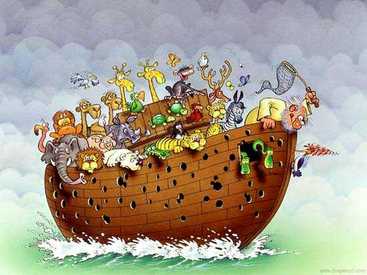
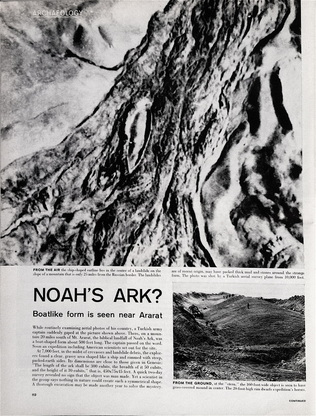
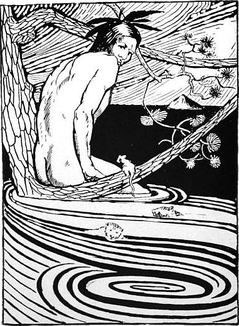
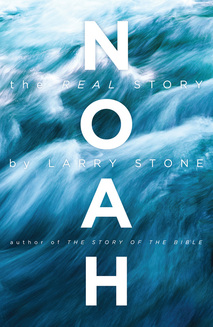
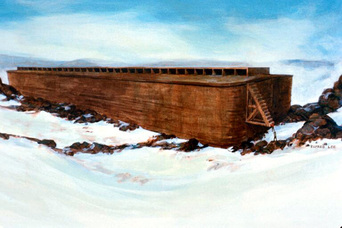
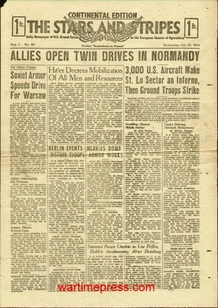
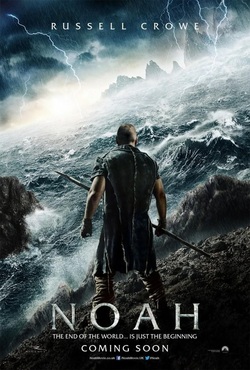
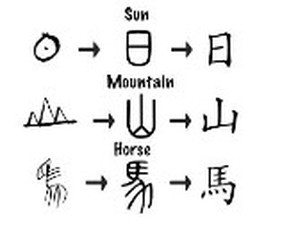


 RSS Feed
RSS Feed